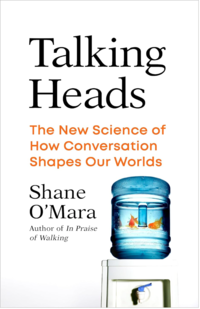OFF THE SHELF: FEBRUARY 2024

OFF THE SHELF: FEBRUARY 2024
Neuroscience unravels populism this month, plus hijacking to kayaking and much more besides
Published: 13 February 2024
Author: Richard Lofthouse
Share this article

Talking Heads: The New Science of How Conversation Shapes Our Worlds by Shane O’Mara (Bodley Head, 2023)
The author (St Anne’s, 1994) is Professor of Experimental Brain Research at Trinity College, Dublin, and a prominent neuroscientist.
This is a very important book because it drills down into how we shape realities through conversation and dialogue, including identity, filtering down into bedrock convictions that can result in wars.
Wait a minute? Wars? Yes exactly. The book starts with memory, amnesia, dementia; the personal stuff. But then it progresses to shared cognitive realities, pasts and futures, the creation of culture, and then in chapter 8, ‘Our Nations Began as Conversations: Countries are Cognitive Constructs.’
There is much of interest along the way. Shane argues that our populous cities are miraculous evidence of human peaceability, relatively speaking. That is to say, close relatives like chimpanzees are twenty to thirty times more aggressive to each other than are we.
But Seneca was also right when he said that ‘Everyone prefers belief to the exercise of judgement.’ So it’s not a big leap to agreeing with each other that a particular election was stolen even if it wasn’t. Reason is subject to bias.
The book culminates in a great shazam. The author considers the many popular nation and passport ‘rankings’ that seek to demonstrate which passport is the most desirable to own. Such rankings are nothing but ‘meta-collective status comparison.’
Conceived before COVID but finished amidst Russian attempts to annihilate Ukraine, the author appends a wise afternote addressing the fact that as a species we forget plagues but remember wars. We’re a funny lot, us humans.
The author notes his podcast with fellow Oxonian and former UK FCO diplomat, and frequenter of these pages, Arthur Snell (Magdalen, 1994): https://shows.acast.com/65196b0b1488340011cf14a1

Shaping Nations and Markets: Identity Capital, Trade, and the Populist Rage (Routledge, 2023) by Vinícius Guilherme Rodrigues Vieira.
An academic work with a frightening cover price but relates to the theme of national identity. Vinícius (Nuffield, 2010) employs a mixed methods approach to get into the deeply contested terrain of why a nation might pursue liberalism or protectionism in matters economic. Too often, he contends, the subject has been viewed in terms of economic rationalism, which is naïve. The author proposes that something is missing—identity capital. This book offers a theoretical framework to unpack national identity, trade liberalization, nationalist-populism, domestic politics, and globalization. The author argues that the key for identifying whether liberalizing or protectionist coalitions prevail in trade negotiations is identity capital. He offers a comparison of the three largest contemporary, federal, multicultural democracies: Brazil, India, and the United States.

The Hijacking of American Flight 119 How DB Cooper Inspired a Skyjacking craze and the FBI's Battle to stop it by John Wigger (OUP, February 2024)
Out this month, this jolly narrative by Oxford University Press considers the wave of aircraft hijackings in the period 1961-72, the most infamous the one of the title. D.B. Cooper remains a hypothesis, to this day the only unsolved case in the entire history of commercial aviation and as such the stuff of myth and legend. More broadly, John Wigger explores copycat exploits. One hijacker ran across the ramp in Reno, Nevada with a pillowcase over his head, gun in hand, to seize a United Airlines flight. Another collected a large ransom in Washington, D.C. before jumping out of the aircraft over Honduras. Yet another rode a bicycle across the tarmac with a rifle strapped to the handlebars. Motivations involved an admixture of ideology, greed, derring-do, and a desperate need to be somebody. What they had in common was that their exploits transfixed the nation's attention, bringing about a transformation in airline security that remains with us still.
Kayaking the Sea Roads: Exploring the Scottish Highlands by Ed Ley-Wilson, (Whittles Publishing, 2023)

Covered at greater length in a separate feature, this book involves alumnus Ed Ley-Wilson (Harris Manchester, 1994) paddling a kayak in search of the soul of the Scottish Highlands, in the very wet summer of 2022. There is a deeper purpose – the book fulfils Janice’s definition of questing, since the exact purpose is left open but purpose is sought; and in some other senses the weather and tides create the sort of adversity that would suit a pilgrimage but it is down to the reader to determine whether or not this has a spiritual dimension. Penance can be secular as well. Anyway: it is a lovely volume with art work, photography and literary references, a great sense of adventure, an absence of mobile phones and a journalistic appetite for reporting humans and nature.
It would be remiss of us not to mention a New Statesman reading list for 2024 featuring two new books by Oxford academics. One is ‘How the World Made the West: A 4,000 Year History’ by Josephine Quinn, Professor of Ancient History at Oxford University, that argues that societies do not form or collapse in isolation, but through encounters and exchanges with other cultures. The other is ‘Metamorphoses: In Search of Franz Kafka’ by Dr Karolina Watroba, Fellow of All Souls College, which gives an inventive biography that presents the absurdist master as a writer for our times. The latter is timely because the Bodleian library is about to celebrate Kafka as exactly that – an absurdist for absurd times.
Off the Shelf typically concerns books where there is an Oxford connection, whether the place, the University or of course the author. Our editorial selection rests on books appealing to the broadest alumni audience.
For more recommended books of 2023 from Oxford academics and alumni, head over to the @oxfordalumni social channels on Instagram, Facebook and X.
Alumni can claim 15% discount in any Blackwell's store with a My Oxford Card.
Alumni can claim 20% discount at Oxford University Press.
Join the Oxford Alumni Book Club at: www.alumni.ox.ac.uk/book-club















